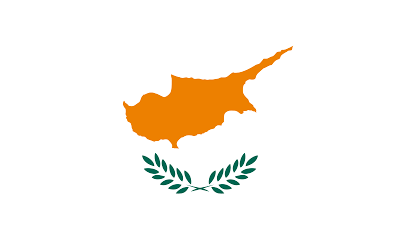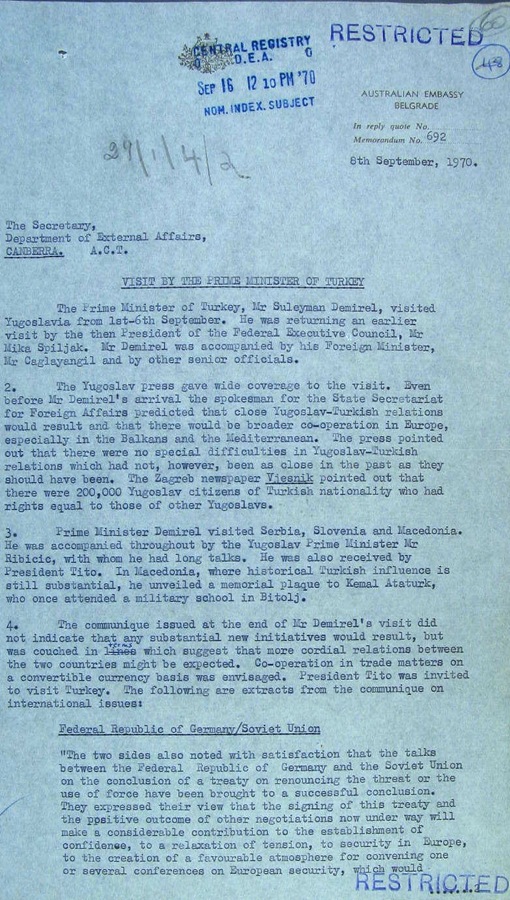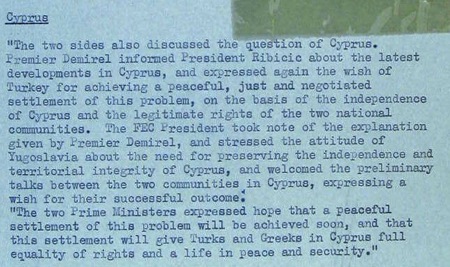TITO AND THE TURKS: Communist Yugoslavia plays the Cyprus card.
By Sasha Uzunov
De-classified Australian diplomatic cables paints Turkey in a positive light in the lead up to the 1974 Cyprus conflict, and Communist Yugoslavia in a Machiavellian role.
A large file on Yugoslav-Turkish foreign relations dating from the 1950s to the 1970s has been de-classified and placed in the National Archives of Australia.
Two cables written by Australian diplomats serving in Yugoslavia, one from 1967 and the other from 1970, highlight Turkey’s moderate stance on Cyprus, an independent island state in the Mediterranean Sea with a mixed Greek-Turkish population, which later erupted into war in 1974 and almost tore apart NATO.
The 1967 cable about Yugoslavia’s overtures for better relations with Turkey reveals Turkey’s firm but moderate policy on Cyprus and Yugoslavia’s subtle playing off Turkish/Greek rivalries. :
“The Turkish Foreign Minister had said that at the United Nations Yugoslavia had been hostile to the Turkish position…The Yugoslav Foreign Minister had replied that Yugoslavia wanted an independent, non-aligned (no military bases) Cyprus where both Greek and Turkish communities could live peacefully side-by-side. The Turkish Foreign Minister was grateful to hear this and asked his Yugoslav counterpart to say so publicly. The Yugoslavs demurred…”

The cable also mentions Communist Yugoslavia’s ruler, Marshal Tito’s friendship with Archbishop Makarios III, the President of Cyprus at the time and leader of the Cypriot Greek Orthodox Church.
Photos: (left) Makarios III, – President of Cyprus (1960–1974 and 1974–1977).
Makarios was overthrown in a coup by Greek military officers in 1974, seeking to unify Cyprus with mainland Greece, in breach of international treaties and which led Turkey to intervene in Cyprus.
(Right): Master manipulator: Communist Yugoslavia’s ruler Marshal Josip Broz Tito (wearing glasses), pictured here with US President Richard Nixon at the White House, 1972.
Tito’s whole shtick revolved around his great balancing act between East and West, the Soviet Bloc versus NATO, playing on or provoking one ethnic group against another: Serbs against Croats, Turks against Greeks, Greeks against Macedonians, and then appearing the moderate in public whilst squeezing out economic aid from the West for his pretend “moderation.”
The second cable, detailing Turkish Prime Minister Suleyman Demirel’s 1970 visit to Yugoslavia, also repeated the same policy on Cyprus.
Tito bent over backwards to impress Demirel:
“In Macedonia, where historical Turkish influence is still substantial he [Demirel] unveiled a memorial plaque to Kemal Ataturk, who once attended a military school in Bitolj [Bitola].”
Below the 1970 Australian diplomatic cable.
Cyprus was a predominantly Greek populated island which fell under Turkish Ottoman rule in 1571 but was taken over by the British in 1878. The British colonial rulers used the deliberate policy of divide and rule to keep Greeks and Turks at each other’s throats. By the 1950s, a Greek Cypriot insurgent movement, EOKA, labelled as terrorist by the London, began a campaign to bomb the British and the Turks out of Cyprus and unify (enosis) the island with mainland Greece.
From 1955 to 59 the “Cyprus Emergency” saw the British Army and Police conduct counter-insurgency and counter-terrorism operations against EOKA, which was led by the colourful Greek Army General George Grivas.
By 1960 Cyprus was granted independence on the condition it remain independent and not unify with Greece, the Turkish population guaranteed protection and Britain allowed to maintain military bases. However, inter-communal conflict erupted and in 1964 a UN Peacekeeping mission sent in to keep Greeks and Turks apart.
Meanwhile, in 1967 a right-wing Military Coup in mainland Greece toppled the elected government and later deposed the monarchy. Mainland Greek Army officers manned Cyprus’s National Guard and in July 1974 under the leadership of flamboyantly named Nikos Sampson staged a coup against President Makarios with the aim of enosis.
Turkey responded with military force and officially terms it as a peacekeeping operation to protect the Turkish population but others saw it as an invasion. Heavy fighting erupted between the Turkish Army and the Greek Cypriot National Guard with UN peacekeepers, in particular Canadian soldiers, caught in between.
CANADA CAUGHT IN THE CYPRUS CROSSFIRE:
An honour guard carries the casket bearing Pte. Joseph Lionel Gilbert Perron, who was killed on a peacekeeping mission in Cyprus on Aug. 6, 1974. source: The Star newspaper story: “Summer of ’74 a dark time for our peacekeepers”
Authors Scott Taylor and Brian Nolan reveal in their book, Tested Mettle: Canada’s Peacekeepers at War: “it was an important moment in the history of Canadian peacekeeping, marking the first time Canadian soldiers used force to defend themselves.”
The small group of Canadians soldiers, largely drawn from the Airborne, took enormous fire from a massively larger Turkish force trying to take the strategically important airport in Nicosia, the capital, defended by the Greek Cypriot National Guard.
Canadian Army Colonel Don Manuel said: “The Canadian resolve to hold the airport was bravado but it worked.”
Taylor and Nolan write: Throughout the first three days the Canadians were under direct fire from both sides, so it wasn’t surprising that orders were issued to hit back if their lives were threatened.”
The Turkish Army quickly took control over 40 per cent of Cyprus. A ceasefire was eventually brokered and the island remains divided till this day.
The Greek Military Junta in Athens fell as a consequence of its inability to aid the Greek Cypriots. Ironically, nominal parliamentary democracy was returned to Greece.
The Cyprus conflict pitted three allies of the North Atlantic Treaty Organisation (NATO), the anti-communist alliance set up during the Cold War, Greece, Turkey and Canada against each. The real fear at the time was of a larger conflict between Greece and Turkey, which would have destroyed NATO.
(end)
.svg.png)






I believe the 2nd gentleman is my father, he served in Cyprus at this time and had many storys to share at the cost of having nightmares the same night. He did loose a close friend there which enforces my thought that this may be my father in the honor guard.